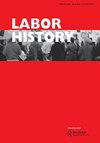冷战时期国际移民的管制:文献综述
IF 0.7
4区 管理学
Q1 HISTORY
引用次数: 0
摘要
摘要长期以来,对冷战时期国际移民的研究认为,自由主义和共产主义意识形态冲突导致的政治移民与资本主义世界经济转型导致的劳动力移民之间存在着严格的区别。这篇文章从几个方面对这一假设提出了质疑。它的出发点是,冷战主要是资本主义和共产主义发展项目之间的竞争。它将这种竞争归因于战后早期规范移民的国际体系的建立,将其视为意识形态对抗的领域,并将其演变为20世纪70年代以来发展战略趋同的领域。它回顾了有关西欧劳动力迁移的文献,以及最近探索社会主义欧洲如何也依靠外国劳动力招聘来实现发展的研究。它将这些发现与研究东欧和西欧在漫长的20世纪70年代扩大经济合作的研究相结合。它表明,在这种情况下,经济移民和政治难民之间的区别继续证明了建立有线墙的正当性,这一次是在扩大的欧洲联盟和全球南方之间。本文章由计算机程序翻译,如有差异,请以英文原文为准。
The regulation of international migration in the Cold War: a synthesis and review of the literature
ABSTRACT For a long time, research on international migration during the Cold War maintained that a rigid distinction existed between political emigration, generated by the ideological conflict between liberalism and communism, and labour migration, which was determined by transformations in the capitalist world economy. This article challenges that assumption on several grounds. It starts from the premise that the Cold War was primarily a competition between the capitalist and communist projects of development. It ascribes to this rivalry the establishment of the international system regulating migration as a terrain of ideological confrontation in the early postwar period, and its evolution into one of convergence over development strategies since the 1970s. It reviews both the literature on labour migration to/in Western Europe and the recent studies exploring how socialist Europe also relied on foreign labour recruitment to achieve development. It brings these findings in conversation with research that examines the expansion of economic cooperation between Eastern and Western Europe during the long 1970s. It shows that, in this context, the distinction between economic migrant and political refugee continued to justify the erection of wired walls, this time between an enlarging European Union and the Global South.
求助全文
通过发布文献求助,成功后即可免费获取论文全文。
去求助
来源期刊

Labor History
Multiple-
CiteScore
1.00
自引率
28.60%
发文量
44
期刊介绍:
Labor History is the pre-eminent journal for historical scholarship on labor. It is thoroughly ecumenical in its approach and showcases the work of labor historians, industrial relations scholars, labor economists, political scientists, sociologists, social movement theorists, business scholars and all others who write about labor issues. Labor History is also committed to geographical and chronological breadth. It publishes work on labor in the US and all other areas of the world. It is concerned with questions of labor in every time period, from the eighteenth century to contemporary events. Labor History provides a forum for all labor scholars, thus helping to bind together a large but fragmented area of study. By embracing all disciplines, time frames and locales, Labor History is the flagship journal of the entire field. All research articles published in the journal have undergone rigorous peer review, based on initial editor screening and refereeing by at least two anonymous referees.
 求助内容:
求助内容: 应助结果提醒方式:
应助结果提醒方式:


